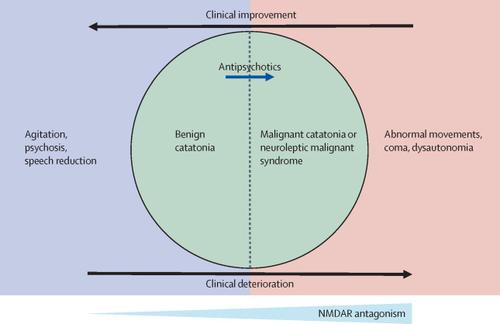The Lancet Psychiatry ( IF 30.8 ) Pub Date : 2019-06-10 , DOI: 10.1016/s2215-0366(19)30190-7 Jonathan P Rogers 1 , Thomas A Pollak 1 , Graham Blackman 1 , Anthony S David 2

|
Catatonia is a psychomotor disorder featuring stupor, posturing, and echophenomena. This Series paper examines the evidence for immune dysregulation in catatonia. Activation of the innate immune system is associated with mutism, withdrawal, and psychomotor retardation, which constitute the neurovegetative features of catatonia. Evidence is sparse and conflicting for acute-phase activation in catatonia, and whether this feature is secondary to immobility is unclear. Various viral, bacterial, and parasitic infections have been associated with catatonia, but it is primarily linked to CNS infections. The most common cause of autoimmune catatonia is N-methyl-D-aspartate receptor (NMDAR) encephalitis, which can account for the full spectrum of catatonic features. Autoimmunity appears to cause catatonia less by systemic inflammation than by the downstream effects of specific actions on extracellular antigens. The specific association with NMDAR encephalitis supports a hypothesis of glutamatergic hypofunction in catatonia.
中文翻译:

紧张症和免疫系统:综述。
紧张症是一种精神运动障碍,以木僵、姿势和回声现象为特征。本系列论文探讨了紧张症免疫失调的证据。先天免疫系统的激活与沉默、退缩和精神运动迟缓有关,这些构成了紧张症的植物神经特征。关于紧张症急性期激活的证据很少且相互矛盾,并且尚不清楚该特征是否继发于不动。各种病毒、细菌和寄生虫感染都与紧张症有关,但它主要与中枢神经系统感染有关。自身免疫性紧张症最常见的原因是 N-甲基-D-天冬氨酸受体 (NMDAR) 脑炎,它可以解释所有的紧张症特征。自身免疫引起紧张症的原因似乎不是全身炎症,而是细胞外抗原特异性作用的下游效应。与 NMDAR 脑炎的特定关联支持紧张症中谷氨酸能功能减退的假设。













































 京公网安备 11010802027423号
京公网安备 11010802027423号